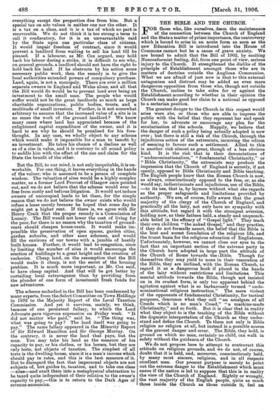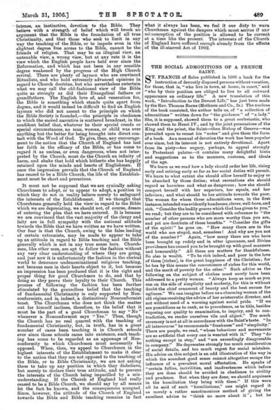THE BIBLE AND THE CHURCH.
FOR Chose who, like ourselves, deem the maintenance of the connection between the Church of England and the State a matter of prime importance, the controversy which is bound to arise in an acute form as soon as the new Education Bill is introduced into the House of Commons cannot but be a cause of grave anxiety. We are bound to admit that the Bill of 1902, by exciting Nonconformist feeling, did, from one point of view, serious injury to the Church. It strengthened the dislike of the principle of Establishment amongst those who are in matters of doctrine outside the Anglican Communion. What we are afraid of just now is that to this external antagonism and distrust may be added an even more dangerous opposition from those who, though not outside the Church, incline to take sides for or against the Establishment according to whether in their opinion the Church can make good her claim to a national as opposed to a sectarian position.
The greatest danger to the Church in this respect would arise were she, or those who are able to impress the public with the belief that they represent her and speak for her, to advocate or encourage any plea for the secularisation of the schools. Happily, we believe that the danger of such a policy being actually adopted is now over ; but there is still a risk of the Church, through the injudicious action of the extremists, incurring the odium of seeming to favour such a settlement. Allied to this is another risk almost as great, though of a less obvious kind. It is the risk that in their denunciations of " undenominationalism," "fundamental Christianity," or "Bible Christianity," the extremists may produce the impression that the Church of England is secretly, if not openly, opposed to Bible Christianity and Bible teaching. The English people know that the Roman Church is now, as always, conscientiously opposed to the free, or, as she would say, indiscriminate and injudicious, use of the Bible, —to its use, that is, by laymen without what she regards as the proper safeguards and limitations provided by authority. We are, of course, fully aware that the great majority of the clergy of the Church of England, and practically all the laity, not only have no sympathy with this attitude, but regard it with the strongest aversion, holding now, as their fathers held, a steady and unquench- able belief in the efficacy of "Gospel light." They teach their own children "the naked Gospel," and they practise, if they do not formally assert, the belief that the Bible is the best and surest foundation of the religious life, and the truest basis for the religious education of Englishmen. Unfortunately, however, we cannot close our eyes to the fact that an important section of the extreme party in the Church have adopted in large part the attitude of the Church of Rome towards the .Bible. 'Though for themselves they may yield to none in their veneration of the Bible, they are inclined, with the Roman Church, to regard it as a dangerous book if placed in the hands of the laity without restrictions and limitations. This mental attitude towards the Bible, though not insisted on in its crudest form, is only too apparent behind the agitation against what is so barbarously termed " unde- nominational religious instruction." The more violent of the opponents of fundamental Christianity, for tactical purposes, denounce what they call "an amalgam of all Creeds which is no man's Creed," "a machine-made Christianity," and so forth. But it is clear that in reality what they object to is the teaching of the Bible without the dogmatic interpretation of the Church as they under- stand and define the Church. To them not only is Bible religion no religion at all, but instead is a possible source of the gravest danger and error. The Bible, they hold, is ground on which no man, certainly no child, can walk in safety without the guidance of the Church.
We do not propose here to attempt to controvert this attitude on religious grounds, and we do not, of course, doubt that it is held, and, moreover, conscientiously held, by many most sincere, religious, and in all respects excellent men. Our present purpose is merely to point out the extreme danger to the Establishment which must ensue if the nation is led to suppose that this is in reality the view of the Church of England. Rightly or wrongly, the vast majority of the English people, quite as much those inside the Church as those outside it, feel an • intense, an instinctive, devotion to the Bible. They believe with a • strength of belief which will brook no argument that the Bible is the foundation of all true Christianity, and that those who seek to limit in any way the teaching of the Bible, or to impede even in the slightest degree free access to the Bible, cannot be the friends of religion. That may be an illogical view, an untenable view, a wrong view, but at any rate it is the view which the English people have held ever since the Reformation, and which has not been in any sensible degree weakened by the progress of the High Church revival. There are plenty of laymen who are convinced Ritualists, and who hold extremely advanced opinions in regard to Church doctrine, but who nevertheless entertain what we may call the old-fashioned view of the Bible quite as strongly as did their Evangelical fathers or grandfathers. The English love of, and veneration for, the Bible is something which stands quite apart from dogma, and it would indeed be difficult to find an English layman who did not assent to the principle on which the Bible Society is founded,—the principle in obedience to which the sacred narrative is scattered broadcast, in the confident belief that, whatever be their special creeds or special circumstances, no man, woman, or child was ever anything but the better for being brought into direct con- tact with the Word of God. To give, then, any encourage- ment to the notion that the Church of England has lost her faith in the efficacy of the Bible, or has come to regard it as useless, or even dangerous, when not inter- preted by the Church, must do the Church an infinity of harm, and shake that hold which hitherto she has happily retained upon the minds and hearts of Englishmen. If once the impression prevails that the Church of England has ceased to be a Bible Church, the life of the Establish- ment must be short and precarious.
It must not be supposed that we are cynically asking Churchmen to adopt., or to appear to adopt, a position in which they do not in reality believe merely to safeguard the interests of the Establishment. If we thought that Churchmen generally held the view in regard to the Bible which we are deprecating, we should not, of course, dream of entering the plea that we have entered. It is because we are convinced that the vast majority of the clergy and laity are in full sympathy with the national attitude towards the Bible that we have written as we have written. Our fear is that the Church, owing to the false leading of certain extremists, may be made to appear to take' up an attitude in regard to Bible teaching and the Bible generally which is not in any true sense hers. Church- men, like other men, are apt to follow the fashion without any very clear understanding of where they are going, and just now it is unfortunately the fashion in the clerical world to denounce undenominational religious teaching, not because men in their hearts object to it, but because an impression has been produced that it is the right and proper thing for good Churchmen to do, and that by doing so they prove their loyalty to their Church. This process of following the fashion has been further stimulated by the groundless belief that the teaching of ' fundamental Christianity is only supported by Non- conformists, and is, indeed, a distinctively Nonconformist tenet. The Churchman who does not think the matter out for himself inclines, therefore, to the belief that it must be the part of a good Churchman to say " No " whenever a Nonconformist says "Yes." Thus, though the Church has no real quarrel with the teaching of fundamental Christianity, but, in truth, has in a great number of cases been teaching it in Church schools ever since those schools came into existence, such teach- ing has come to be regarded as an appanage of Non- conformity to which Churchmen must necessarily be opposed. When, then, we appeal to Churchmen in the highest interests of the Establishment to make it clear to the nation that they are not opposed to the teaching of the Bible, or to Bible Christianity, we are not asking them to take up any position in which they disbelieve, but merely to declare their true attitude, and to prevent the interests of the Church being imperilled by a mis- understanding. If the Church of England had really ceased to be a Bible Church, we should say by all means let the fact be known, and the consequences accepted. Since, however, the attitude of the Church of England towards the Bible and Bible teaching remains in fact what it always has been, we feel it our duty to warn Churchmen against the dangers which must accrue if any miwonception of the position is allowed to be current at a time like the present. The interests of the Church of England have suffered enough already from the effects of the ill-starred Act of 1902.











































 Previous page
Previous page